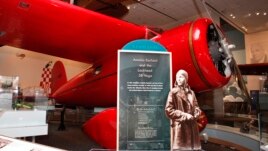31 January 2024
An unclear sonar image recorded by a private pilot has renewed interest in a past mystery: What happened to Amelia Earhart, the pilot who disappeared in 1937 with her plane?
Many searches have found nothing. But Tony Romeo now believes his new South Carolina-based sea exploration company captured a partial image of Earhart's famous plane.
Researchers and explorers are hopeful. But whether Earhart's plane lies at about 4,800 meters beneath the ocean remains to be seen.

FILE - Amelia Earhart's plane is seen at the Smithsonian's National Air and Space Museum in Washington, Tuesday, Nov. 16, 2010, after an overhaul of one of the museum's original galleries, the "Pioneers of Flight" exhibit. (AP Photo/Jacquelyn Martin, File)
How was the object found?
Romeo said he had long held interest in the Earhart mystery. So, he bought a $9 million underwater drone from a Norwegian company. The drone is called the Hugin 6000. It includes the newest technology. It can dive down to 6,000 meters.
A 16-person crew began a search in the western Pacific Ocean in September 2023. They searched over 13,400 square kilometers of seafloor. The crew searched around Howland Island between Papua New Guinea and Hawaii.
But it was not until the team looked at the sonar data in December that they saw the unclear yellow outline of what looked like a plane.
"In the end, we came out with an image of a target that we believe very strongly is Amelia's aircraft," Romeo told the Associated Press.
The next step is taking a camera underwater to better examine the unidentified object. If camera images confirm the explorers' hopes, Romeo said the goal would be to raise Earhart's airplane.
Romeo said his team undertook the trip to "solve aviation's greatest unsolved mystery." Depending on what they find, they might answer if Earhart and her navigator, Fred Noonan, escaped after hitting the ocean, or learn more about what went wrong.
The mystery of Earhart
Earhart and Noonan disappeared while flying from New Guinea to Howland Island. That trip was part of her attempt to become the first female pilot to fly around the world. She had radioed that she was running low on fuel.
The Navy searched but found nothing. The U.S. government's official position has been that Earhart and Noonan went down with their plane.
Since then, there have been many theories. They include that Earhart was taken by aliens, lived in New Jersey under another name, she was killed by the Japanese, or died on an island.
"Amelia is America's favorite missing person," Romeo said.
‘We need to see more'
Sea archaeologist James Delgado said Romeo's possible find would change the story, but "we need to see more."
"Let's drop some cameras down there and take a look," said Delgado. He is senior vice president of the archaeological company SEARCH.
Delgado said Romeo's search used the newest technologies that were once only available to the government.
But he said Romeo's team must provide detailed documentation to prove it is Earhart's plane.
If the object really is the historic aircraft, the question for the team is if it is safe to raise. How much of the plane is left would be decided by how smoothly Earhart landed," said Dorothy Cochrane of the National Air and Space Museum.
"That's where you have to really look at this image and say, ‘What have we got here?'" said Cochrane.
What if Earhart's plane has been found?
If the discovery turns out to be her plane, international rules for underwater archaeology would suggest that the aircraft remain where it is, said Ole Varmer. He is a retired lawyer with the National Oceanic and Atmospheric Administration and an advisor at The Ocean Foundation, an environmental group based in Washington, D.C.
Less damaging research can still be carried out to find why the plane crashed, Varmer said.
Varmer added, "You preserve as much of the story as you can." And he said, "When you salvage it, you're destroying part of the site, which can provide information."
Raising the plane and showing it to the public would likely cost hundreds of millions of dollars, Varmer said. And while Romeo could possibly make a salvage claim in a court, the plane's owner has the right to deny it.
Earhart bought the plane with money raised, at least in part, by the Purdue Research Foundation, Purdue University in Indiana said in a blog. She planned to return the aircraft to the school.
Romeo said the team believes the plane belongs in the Smithsonian. He said the issue likely presents a new kind of legal case. He said his exploration company will "deal with those as they come up."
I'm Gregory Stachel.
James Pollard and Ben Finley reported this story for The Associated Press. Gregory Stachel adapted it for VOA Learning English.
______________________________________________
Words in This Story
sonar – n. a device used for finding things that are underwater by using sound waves
drone – n. a type of small aircraft that flies without a pilot
aircraft – n. a machine (such as an airplane or a helicopter) that flies through the air
aviation – n. the business or practice of flying airplanes or helicopters
navigate – v. to find the way to get to a place when you are traveling in a ship, airplane, or car
alien – n. a creature that comes from somewhere other than the planet Earth
archeology – n. a science that deals with past human life and activities by studying the bones or tools of ancient people
preserve – v. to keep (something) in its original state or in good condition
salvage – v. to remove (something) from a place so that it will not be damaged, destroyed, or lost